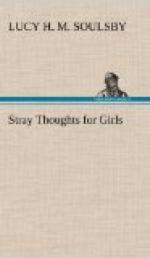Besides, you will not find Pleasure-seeking pays in the long run! If you are feeling that Pleasure with a big “P” is your due, then all the little annoyances prick and irritate. If you pay heavily for a new dress which hangs badly, it is trying; if you never expected a new dress at all, and that same dress was unexpectedly given you, the drawback would be looked at very differently.
It would pay pleasure-seekers to try the old plan of looking on life as a Duty, where pleasures came by accident or kindness, and were heartily and gratefully enjoyed. Do you remember in the “Daisy Chain,” how Ethel says, after the picnic, that the big attempts at pleasure generally go wrong, and that the true pleasures of life are the little unsought joys that come in the natural course of things? Dr. May disliked hearing her so wise at her age, but I think it must have been rather a comfort to Ethel to have found it out. No thought of that kind damps your pleasure when the dance or the picnic turn out a great success! And when they do not, it is nice to feel there are other things in life. Every one knows how often something goes wrong at a big pleasure; the right people are not there, or your dress is not quite right; you are tired, or you say the wrong thing; while, if you get much pleasure, a certain monotony is soon felt, and you envy the vivid enjoyment of the girl who scarcely ever has a treat.
It stands to reason, that if you are deliberately arranging to get pleasure, and plenty of it, you cannot (from a purely pleasure point of view) enjoy it as much as if your life consisted of duties, and your pleasures came by the way. But there is a deeper reason why a life of amusement fails to amuse. It is not only that we are so made that nearly all our sensations of pleasure depend on novelty, the keenness wearing off if a sensation is repeated.
The reason lies in a fact which militates against the Pleasure-seeker’s foundation idea:—the fact that we are made for something else than pleasure, failing which we remain unsatisfied. “There is in man a HIGHER than Love of Happiness: he can do without Happiness, and instead thereof find Blessedness.”
Here is the point I should like you to think clearly out for yourselves. Fifty years ago, Carlyle taught this truth as with thunder from Sinai. Let us imbue our minds with his passionate scorn for those who come into this noble world to suck sweets,—to have “a good time.” “Sartor Resartus,” one of the Battle-cries of Life, and “Past and Present,” which has small mercy for idlers and pleasure-seekers, are character-making books:—
“There went to the making
of man
Time with a gift
of tears,
Grief with a glass that ran,”
and there also go, to the making of man and woman, certain books.
These may vary in each case and in generation. Tom Brown and Mr. Knowles’ “King Arthur” may not do for you what they did for me; “Sesame and Lilies,” “Past and Present,” Emerson’s “Twenty Essays” may be superseded, though I can hardly believe it; but see to it that you find and read their true successors, carry out Dr. Abbott’s advice to his boys—to “read half a dozen de-vulgarizing books before leaving school.”




